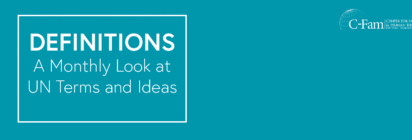
Europeans Create New Censorship Body
NEW YORK, March 6 (C-Fam) The EU Commission launched the European Centre for Democratic Resilience last week, a new body that will ramp-up a complex digital censorship and social control apparatus across the European Union and beyond.

UN Kid’s Book Fair Promotes Polyamory/Surrogacy
UNITED NATIONS, March 6 (C-Fam) A children’s book fair is on display at UN headquarters in New York this week, and several of the books promote gender ideology, normalize polyamory and surrogacy, and instill a sense of panic about climate-related catastrophe.

CIA Promoted LGBT & Abortion to Muslims
NEW YORK, February 25 (C-Fam) CIA Director John Ratcliffe has ordered the intelligence agency to retract and revise nineteen “intelligence products” because they were determined to be highly politicized and contained substandard work. Three of the reports were published by Ratcliffe in a redacted format.

Argentina Pushes Back on Treaty Body Overreach
WASHINGTON, D.C. February 27 (C-Fam) The government of Argentina has taken a UN human rights treaty body to task because it promoted abortion as a human right, as well as other controversial elements not in the treaty under consideration.
Chair of the Committee on the Elimination of Discrimination Against Women (CEDAW Committee)









